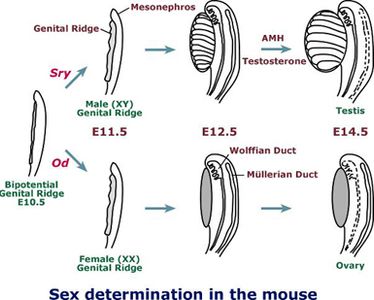Developmental Genetics
It is estimated that approximately one in 1000 newborns has a gonadal or genital abnormality. Therefore, a better understanding of mammalian gonad development and sex determination is important for both biomedical and basic scientific reasons. A number of sex determination genes have been identified and characterized. Most of these are implicated in pathological processes in humans, and have essential roles in the normal development of organs other than the gonads. However, how these genes function within the gonad development pathway is poorly defined, and many new genes remain undiscovered. We use the laboratory mouse as a model system to investigate the molecular genetic mechanisms of mammalian sex determination and early gonad development. To better understand these processes, we employ a variety of approaches including classical genetics, gene targeting and transgenics, molecular genetics, genomics, cell biology and embryology.
